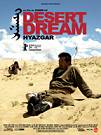|
|
||||
|
|
by Donald Levit  You’ll probably have to wait against the heaviest odds for your local art theater to offer Desert Dream/Hyazgar, an undistributed find screened six straight days in the Such pacing will not sit well with impatient audiences. To cap it off, there is no background score, with a song on the radio or two sung by characters as giveaway preludes to willing or forced sex. And, less so than in Kaneto Shindō’s international breakthrough The Island, dialogue is virtually absent, in both cases to underline elemental struggle for survival under harsh conditions and, here, because the principals speak mutually unintelligible languages, Mongolian and North Korean. Though it focuses on the individual and not social or political questions, several points remain fuzzy. That hero is Hungai (Bat-Ulzii), whose wife Sarnai (Bayasgalan) “still doesn’t understand after all these years” his insistence on staying put to plant saplings in an attempt to halt further erosion of the dying Mongolian steppes. She is unresponsive to his caresses before leaving for her sister’s in He is left alone and drunk, but almost immediately North Korean refugee Soonhee (Jung Suh) and her son Changho (Shin Dong-ho) walk up to his yurt in the middle of absolutely nowhere and ask to pass the night. Some time goes by, as, neither side learning the other’s language, the boy -- his father shot and killed at the Improbably immaculate in a few simple articles of clothing, she helps plant and water saplings, milk the cow, deliver a lamb, while her son draws, dreams of schoolrooms and follows the man around. Hungai is strong and silent, and admirable in wordlessly chasing away slave traffickers who would buy the Koreans. His pursuit of planting trees is doomed yet quietly dogged, reflected in the wistful merchant who remarks on their interdependence, he the only one who sells saplings and Hungai the only client who buys them. Characters do not much change, though Changho and Hungai have more of themselves revealed in situations, as for example the latter’s befuddlement when summoned urgently to Ecology is not at heart here and hence no hook for Desert Dreams, and without puff, action or even seeming event, it will join a host of other films scarcely screened or seen. Most all of those that fall outside a few narrow categories pass by unnoticed, which is not as it ought to be. (Released by Solaris Distribution; not rated by MPAA.) |
||
|
© 2024 - ReelTalk Movie Reviews Website designed by Dot Pitch Studios, LLC |



